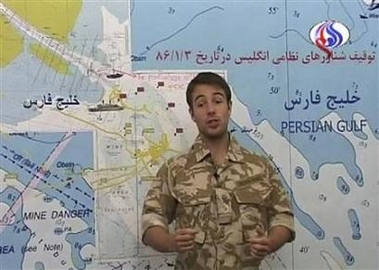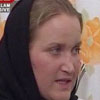All UK captives say entered illegally: Iran radio
(Reuters)Updated: 2007-04-02 16:42
 A video grab from footage shown on Iranian television on April 1, 2007, shows a man in a khaki uniform standing in front of a map of the Persian Gulf while speaking. [Reuters]  |
Britain has dismissed earlier television "confessions" and said they were unacceptable, adding the 15 were in Iraqi waters.
The dispute has raised tensions between the West and the Islamic Republic, already high over Tehran's disputed nuclear programme. It pushed oil prices last week to six-month highs.
The 15 sailors and marines were seized on March 23 in what Iran said was its territorial waters. It has aired footage of four captives -- three men and one woman -- saying they were seized in Iranian waters despite London's denials.
ISNA said Iran had footage of all the British captives "explaining details about their arrest in Iranian waters".
"But because of some changes seen in the last two days in the clamorous British government policies it (the Iranian broadcaster) will not show the details of the interviews."
ISNA did not detail the shift in policy it was referring to but Britain said on Sunday it was in direct communication with Iran. British Foreign Secretary Margaret Beckett said on Saturday "everyone regrets that this position has arisen".
Iranian Foreign Ministry officials could not immediately be reached for comment.
Iranian President Mahmoud Ahmadinejad has said Britain should have apologised. Iranian officials have also criticised Britain for taking the issue to the United Nations, where the Security Council expressed "grave concern" about the case.
A British Foreign Office spokesman, reacting to the latest ISNA report, said: "I don't think the position has changed as far as we are concerned -- they were seized within Iraqi territorial waters, and we are still working to get consular access and for the Iranians to release the group."
'DIRECT BILATERAL COMMUNICATION'
The Iran-Britain standoff comes after two U.N. sanctions resolutions on Iran since December over its nuclear programme, which the West says is a covert effort to build atomic bombs. Tehran denies the charge.
Two of the Britons were shown on Iranian state television on Sunday night pointing to a map to show where they were seized and saying they were picked up in Iranian territory.
"My name is Lieutenant Felix Carmen ... Yes, I'd like to say to the Iranian people, I can understand why you were so angry about our intrusion into your waters ... " one of the Britons said in the television broadcast.
British Defence Secretary Des Browne said on Sunday diplomatic efforts were continuing efforts to end the crisis and said London was in "direct bilateral communication" with Iran.
British officials say they turned to the United Nations to ratchet up pressure on Tehran after a more low-key approach failed to yield results in the first few days of the crisis.
U.S. President George W. Bush has weighed into the row over the captured Britons, saying the detentions were inexcusable and described the 15 as "hostages".
Using the term "hostages" evoked the storming of the U.S. embassy in Tehran after the 1979 Islamic revolution and the holding of 52 Americans for 444 days. Washington broke off relations as a result and ties have never been restored.
Iran said "ill-considered" comments by Bush could harm rather than help the situation.
About 200 demonstrators on Sunday chanted: "British, British, death to you, death to you" outside Britain's embassy and hurled firecrackers into the compound, making loud bangs and sending up clouds of smoke.
No one was hurt by the small explosive devices.
|
||
|
||
|
|

